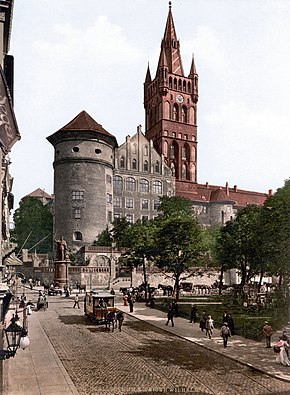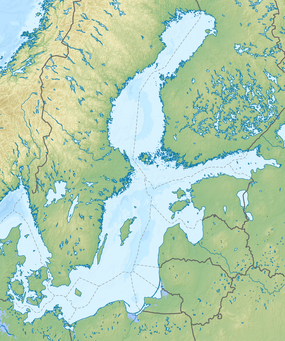Köningsberg
| Königsberg in Prussia | |

Königsberg Castle before World War I
|
|
|
Königsberg was a port city on the south eastern corner of the Baltic Sea. It is today known as Kaliningrad.
|
|
| Alternate name | Кёнигсберг |
|---|---|
| Coordinates | 54°43′00″N 20°31′00″E / 54.71667°N 20.51667°ECoordinates: 54°43′00″N 20°31′00″E / 54.71667°N 20.51667°E |
| History | |
| Founded | 1255 |
| Abandoned | 1945 |
| Associated with | Sambians, Germans, Poles, Jews, Lithuanians |
| Events | World War II |
| Site notes | |
| Ownership | Russia |
Königsberg is the historical name for the present-day city of Kaliningrad. Originally a Sambian, or Old Prussian city, it later belonged to the monastic state of the Teutonic Knights, the Duchy of Prussia, the Kingdom of Prussia, the Russian Empire and Germany until 1946. After being largely destroyed in World War II by Soviet forces and annexed by the Soviet Union thereafter, the city was renamed Kaliningrad. Few traces of the former Königsberg remain today.
The literal meaning of Königsberg is 'King’s Mountain'. In the local Low German dialect, spoken by many of its German former inhabitants, the name was Kenigsbarg (pronounced [ˈkʰeːnɪçsbarç]). Further names included Russian: Кёнигсберг,Королевец, tr. Kyonigsberg, Old Prussian: Kunnegsgarbs, Knigsberg, Lithuanian: Karaliaučius and Polish: Królewiec.
Königsberg was founded in 1255 on the site of the ancient Old Prussian settlement Twangste by the Teutonic Knights during the Northern Crusades, and was named in honour of King Ottokar II of Bohemia. A Baltic port city, it successively became the capital of their monastic state, the Duchy of Prussia (1525-1701) and East Prussia. Königsberg remained the coronation city of the Prussian monarchy, though the capital was moved to Berlin in 1701. It was the easternmost large city in Germany until it was captured by the Soviet Union on 9 April 1945, near the end of World War II.
...
Wikipedia

